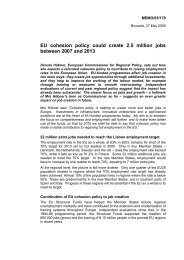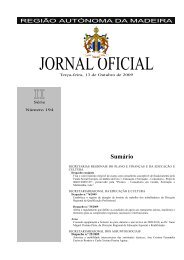Industrial Relations in Europe 2012 - European Commission - Europa
Industrial Relations in Europe 2012 - European Commission - Europa
Industrial Relations in Europe 2012 - European Commission - Europa
Create successful ePaper yourself
Turn your PDF publications into a flip-book with our unique Google optimized e-Paper software.
3.7 Centralisation, decentralisation, differentiation<br />
As <strong>in</strong> the private sector, over the last two decades public sector collective barga<strong>in</strong><strong>in</strong>g and wage<br />
sett<strong>in</strong>g systems <strong>in</strong> many countries have undergone two connected trends, albeit with important<br />
exceptions and qualifications: decentralisation of pay negotiations (<strong>Europe</strong>an <strong>Commission</strong> 2011: Ch<br />
1), and (partial) substitution of automatic, collective, seniority-based pay and career systems with<br />
more selective and discretional systems, often based on performance or merit criteria, lead<strong>in</strong>g to<br />
differentiation of careers and terms and conditions of public employees. In several cases these<br />
trends represent a significant break with a tradition of centralisation and nationally uniform<br />
procedures and terms and conditions. Where decentralisation has occurred, moreover, an important<br />
difference from an <strong>in</strong>dustrial relations perspective is whether this process has taken place with<strong>in</strong> or<br />
outside of a centrally coord<strong>in</strong>ated framework (Traxler 1995).<br />
The reasons for these changes differ accord<strong>in</strong>g to country. In some, they are l<strong>in</strong>ked to the federal<br />
form of the state (Belgium, Germany), <strong>in</strong> others they are l<strong>in</strong>ked to processes of adm<strong>in</strong>istrative and<br />
<strong>in</strong>stitutional decentralisation and <strong>in</strong>creased managerial autonomy, connected to the transfer of<br />
services and tasks to lower levels of government or external agencies, as <strong>in</strong> Austria, Denmark,<br />
Norway, F<strong>in</strong>land, Sweden, Hungary, Ireland, Italy, Portugal, Spa<strong>in</strong>, Slovenia and the UK.<br />
From an employment relations and HRM perspective, the ma<strong>in</strong> purpose of this has been to achieve<br />
flexibility <strong>in</strong> pay and terms of employment, mak<strong>in</strong>g these more responsive to variations <strong>in</strong><br />
local/sectoral labour market conditions and organizational needs. An additional reason, strongly<br />
stressed <strong>in</strong> the NPM approach and <strong>in</strong>spired by moral hazard theory, has been to reduce<br />
opportunistic behaviour with<strong>in</strong> public organisations by mak<strong>in</strong>g agents more responsive and<br />
responsible to their pr<strong>in</strong>cipal and more exposed to the potential costs of their actions. Selective pay<br />
systems, such as performance-related pay, are expected to transfer the costs of hypothetical<br />
opportunistic behaviour at least partially onto the <strong>in</strong>dividual employee, through the denial of pay<br />
<strong>in</strong>creases or promotion which were previously granted automatically. A similar effect is expected <strong>in</strong><br />
the case of decentralisation of pay barga<strong>in</strong><strong>in</strong>g, by l<strong>in</strong>k<strong>in</strong>g the level where collective negotiations<br />
take place and resources are distributed more closely to the level where resources are ideally<br />
produced.<br />
Theory and <strong>in</strong>ternational comparison suggest however that the expected, beneficial effects of<br />
decentralisation of barga<strong>in</strong><strong>in</strong>g and differentiation/<strong>in</strong>dividualisation of pay cannot be taken for<br />
granted but depend on appropriate <strong>in</strong>stitutional conditions. If these are absent, as it is often the case<br />
<strong>in</strong> public services and public sector employment relations, un<strong>in</strong>tended and even perverse effects<br />
may follow. For example, the ga<strong>in</strong>s <strong>in</strong> terms of agency costs may be offset by the rise <strong>in</strong> transaction<br />
costs; collusive behaviours between the decentralized barga<strong>in</strong><strong>in</strong>g parties may occur <strong>in</strong>stead than<br />
more responsible strategies (Rexed et al. 2007; Bordogna 2008).<br />
These considerations apart, the consequences of the recent economic crisis and government<br />
austerity packages on such trends are not univocal. In general, the effects appear to be greater on<br />
decentralisation processes than on the differentiation/<strong>in</strong>dividualisation of pay and career systems. In<br />
various cases barga<strong>in</strong><strong>in</strong>g decentralisation has been halted or even reversed.<br />
The second trend, on the contrary, has apparently been strengthened <strong>in</strong> several countries, along with<br />
the adoption of more private-sector-style HRM practices, although to some extent hampered by the<br />
scarcity of resources. In both cases, a stronger recourse to unilateralism on the part of public<br />
employers has been <strong>in</strong>strumental <strong>in</strong> these changes. Significant differences are, however, observable<br />
across countries, depend<strong>in</strong>g on the gravity of governments’ f<strong>in</strong>ancial difficulties but also on the<br />
appropriateness of the <strong>in</strong>stitutional arrangements under which decentralisation and differentiation<br />
were previously pursued. Comparisons of public and private sector pay practices should also take<br />
<strong>in</strong>to account qualification levels, which tend to be higher <strong>in</strong> the public sector (IFO 2004).<br />
146

















